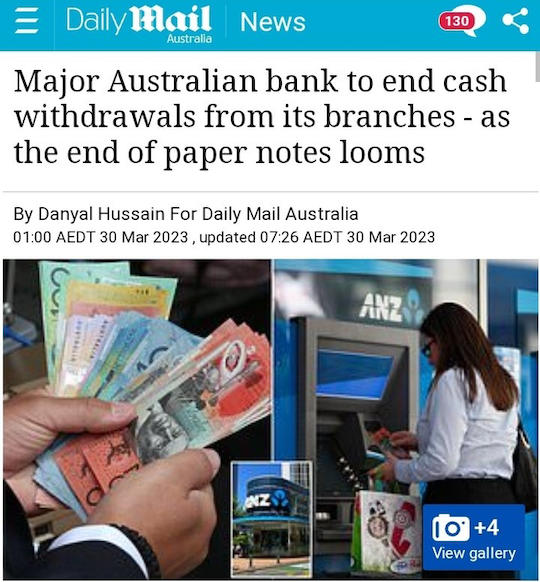When I talk about the war on cash and a cashless society, some people think I’m exaggerating the threat or they don’t take it seriously.
But I’m not exaggerating the threat. It’s here, it’s growing and it’ll only get worse. Just look at a nation like Australia, a Western-style democracy similar in many ways to the U.S.
It provides a cautionary tale to Americans about where the war on cash is heading.
A few months ago, one of Australia’s four major banks announced that it was limiting cash withdrawals and deposits at several of its branches.

Over the past year, $1 billion in bank notes have been removed from circulation in Australia.
And according to a March bulletin from the Reserve Bank of Australia, the percentage of retail payments settled in cash fell from 70% in 2007 to 27% in 2019.
That number is even lower today, as COVID further eased the transition away from cash in 2020. Remember when they were telling us to avoid cash because it might be carrying the virus?
Well, as of last year, the percentage of Australian retail payments settled in cash fell to just 13%. How long will it be before cash payments are eliminated altogether?
Cash Must Go!
As usual, the proponents of the cashless society cite convenience as a major benefit. Why bother having to tote a bunch of cumbersome cash and coins around when you can just swipe a card or pay with your smartphone?
Besides, they say, cash enables criminal activity on the black market. Cash is the money of crime.
A 2018 report by the Australian Fed suggests that as much as 8% of the nation’s outstanding banknotes were being used in the black market.
Then there are the simple costs of creating and transporting cash. Here’s what a professor at a leading Australian university wrote about it:
Although we don’t often think about it, cash costs an awful lot to move, sort and restock.
Printing the notes still makes money — it costs about 32 cents to make each note, whether it’s worth $5 or $100, although making some coins now does lose money.
The real expense is in moving notes and coins around, keeping them nearby and restocking banks and cash registers. Aside from payments the Reserve Bank makes to banks for returning damaged notes, the banks (and, through them, the retailers) are expected to pay for the lot.
In a nutshell, they say that cash is inconvenient, helps criminals and costs too much to create and transport. And the thing is, they’re not necessarily wrong. All of these objections are at least partially valid.
The Biggest Lies Are Laced With Truth
Swiping a card or scanning your smartphone is certainly easier than having to get cash from a bank or ATM and lugging it around in your wallet, dealing with change, etc.
If you eliminate cash and replace it with a Central Bank Digital Currency (CBDC), it would impact the black market (though they’d figure out a workaround).
Meanwhile, cash is costlier than digital money and unlike with cash, you don’t need to hire a Brinks truck to move digital money around. No more bank robberies! And all those truck drivers and security guards can now learn to code!
You get the point. And that’s why the war on cash has been so successful. Digital money is simply more convenient to use than cash.
But here’s what they won’t tell you: You’re being herded into what I call a “digital cattle pen” from which there’s no escape.
And the surest way to lull someone into complacency is to offer a “convenience” that quickly becomes habit and impossible to do without.
Willingly Led to Slaughter
This isn’t limited to Australia, of course. One survey revealed that more than a third of Americans and Europeans would have no problem at all giving up cash and going completely digital. Specifically, the study showed 34% of Europeans and 38% of Americans surveyed would prefer going cashless.
They have no problem with being herded into the digital pen. But they should.
The fact is, governments always use money laundering, drug dealing and terrorism as excuses to keep tabs on honest citizens and deprive them of the ability to use money alternatives such as physical cash, gold and, these days, cryptocurrencies.
The real burden of the war on cash falls on honest citizens who are made vulnerable to wealth confiscation through negative interest rates, loss of privacy, account freezes and limits on cash withdrawals or transfers.
In reality, the so-called “cashless society” is just a Trojan horse for a system in which all financial wealth is electronic and represented digitally in the records of a small number of megabanks and asset managers.
Once that is achieved, it will be easy for state power to seize and freeze the wealth, or subject it to constant surveillance, taxation and other forms of digital confiscation like negative interest rates.
Cash Is the Roadblock
They can’t do that as long as you can go to your bank and withdraw your cash. That’s the key. Cash prevents central banks from imposing negative interest rates because if they did, people would withdraw their cash from the banking system.
If they stuff their cash in a mattress, they don’t earn anything on it; that’s true. But at least they’re not losing anything on it. Once all money is digital, you won’t have the option of withdrawing your cash and avoiding negative rates. You will be trapped in a digital pen with no way out.
In other words, it’s much easier for them to control your money if they first herd you into a digital cattle pen. That’s their true objective and all the other reasons are just a smoke screen.
Again, that’s the part they won’t tell you.
What about cryptocurrencies like Bitcoin? Can you use them to escape from the digital cattle pen?
Let’s first understand that governments enjoy a monopoly on money creation, and they’re not about to surrender that monopoly to digital currencies like Bitcoin. That’s why governments are also conducting a war on cryptos to clear the path for CBDCs that they can control.
Libertarian supporters of cryptos have celebrated their decentralized nature and lack of government control. Yet their belief in the sustainability of powerful systems outside government control was naive.
Blockchain does not exist in the ether (despite the name of one cryptocurrency), and it does not reside on Mars. Blockchain depends on critical infrastructure including servers, telecommunications networks, the banking system and the power grid, all of which are subject to government control.
Crypto evangelists need to understand that reality.
Slowly, Then Suddenly
The good news is that cash is still a dominant form of payment in many countries including the U.S. The bad news is that as digital payments grow and the use of cash diminishes, a “tipping point” is reached where suddenly it makes no sense to continue using cash because of the expense and logistics involved.
Once cash usage shrinks to a certain point, economies of scale are lost and usage can go to zero almost overnight. Remember how music CDs disappeared suddenly once MP3 and streaming formats became popular?
That’s how fast cash can disappear.
Once the war on cash gains that kind of momentum, and we’re really not that far from it, it will be practically impossible to stop.
Besides the loss of privacy, other dangers from the cashless society arise from the fact that digital money, transferred by credit or debit cards or other electronic payments systems, is completely dependent on the power grid.
If the power grid goes out due to storms, accidents, sabotage or cyberattacks, our digital economy will grind to a complete halt. They also won’t tell you that.
The time to protect yourself is now. The best way is to keep a portion of your wealth outside of the banking system.
That’s why it’s a good idea to keep some of your liquidity in paper cash (while you can) and gold or silver coins.
Don’t let them herd you into the digital cattle pen!


